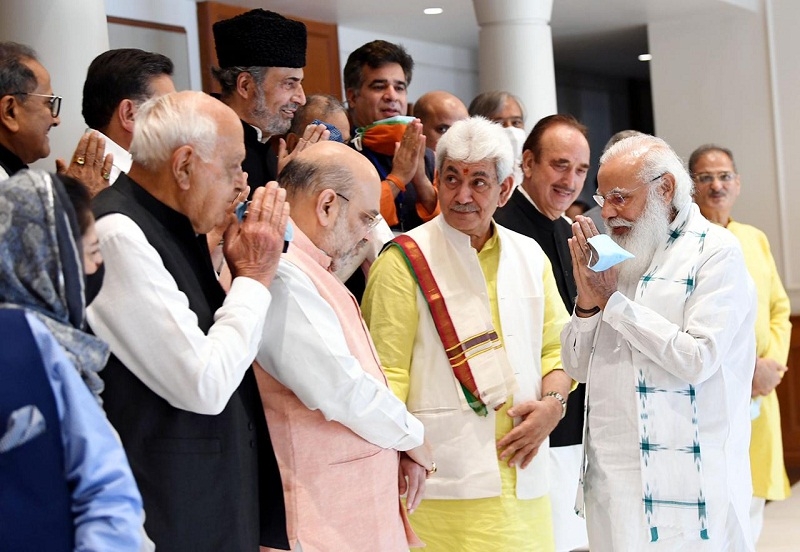PoK on India’s radar? Why Not? - V
 Prime Minister Narendra Modi greeting leaders of all political parties participating in the meeting held on June 24, 2021 on the Kashmir issue.
Prime Minister Narendra Modi greeting leaders of all political parties participating in the meeting held on June 24, 2021 on the Kashmir issue.
Union Home Minister Amit Shah, National Security Advisor Ajit Doval, Jammu and Kashmir Lt. Governor Manoj Sinha and Home Secretary also attended the meeting.
Meanwhile, a day before the all-party meeting, the Election Commission of India (ECI) on Wednesday held virtual discussions with its representatives in Jammu and Kashmir and deputy commissioners regarding the delimitation of the 90 Assembly constituencies in the Union Territory.
The Jammu and Kashmir Reorganization Act 2019 was notified by the government on August 9, 2019, which paved the way for the creation of two Union Territories: Jammu and Kashmir, which would have a legislature and Ladakh, without it.
The Act provides that the number of seats in the legislative assembly of Union Territory of Jammu and Kashmir shall be increased from 107 to 114, and delimitation of the constituencies will be determined by the Election Commission.
The Home Minister said the government is committed to granting statehood to Jammu and Kashmir. Soon after Prime Minister Modi's first all-party meet on Jammu and Kashmir concluded, key leaders who participated in the meeting shared the details of what happened during the hours-long discussion.
Congress leader Ghulam Nabi Azad said that the leaders kept 5 demands in the meeting — grant statehood soon, conduct Assembly elections, rehabilitation of Kashmiri Pandits in J&K, all political detainees should be released and on domicile rules.
“Home Minister (Amit Shah) said that the government is committed to granting statehood to Jammu and Kashmir. All leaders demanded full-fledged statehood,” Azad said.
Azad said that almost 80 per cent of parties spoke on Article 370 but the matter was sub-judice in court. “Our demands included full-fledged statehood soon, elections to restore democracy, rehabilitation of Kashmiri Pandits, all political detainees to be released and land, employment guarantee,” the former Jammu and Kashmir chief minister said.
People's Conference leader Sajjad Lone said the meeting was held in a very cordial manner. “We came out quite positive that hopefully there will be some delivery for the people of Jammu and Kashmir,” he added.
Sharing the details, J&K Apni Party's Altaf Bukhari said that the talks were held in a good atmosphere. Prime Minister Modi, he said, heard issues of all leaders. “PM Modi said that election process will begin when delimitation process finishes,” he added.
Bukhari said that the Prime Minister asked all to participate in the delimitation process. “We have been assured that this is the roadmap towards elections. PM also said that we are committed to the restoration of statehood,” he added.
BJP’s Nirmal Singh said that almost all political parties came to a consensus that there should be peace in Jammu and Kashmir and a government should come there democratically. “Prime Minister Modi appealed to all the leaders that there would be peace only when everyone works together,” he said. Singh further said that the delimitation would be done and after this, further process would be undertaken. “Delimitation Commission will hold discussions with everyone, after those things will move forward,” the BJP leader said. Singh has served as Deputy Chief Minister of Jammu and Kashmir from April 2016 to 2018.
Kavinder Gupta, another BJP leader and former deputy chief minister, said that all political parties presented their opinions. “I think that in the time to come, political process is going to begin. Election will be held after the delimitation process. Assembly will be constituted there once again," he added. Gupta, however, said Article 370 had been abrogated and "it should not even be thought that it will ever come back”.
Muzaffar Hussain Baig said that all leaders demanded statehood. “To which Prime Minister said the delimitation process should conclude first and then other issues will be addressed. It was a satisfactory meeting. There was complete unanimity for restoring peace in Jammu and Kashmir,” he added.
Former chief minister Omar Abdullah said that the leaders told Prime Minister Modi that they didn't stand with what was done on 5th August 2019. “We are not ready to accept it. But we won’'t take law into hands. We will fight this in court. We also told Prime Minister Modi that there's been breach of trust between State and Centre. It’s Centre’'s duty to restore it,” Abdullah said.
“We requested the Prime Minister that our fight will continue but it's essential to reverse some decisions that are not at all in the interest of J&K. It was given the status of a Union Territory, people don't like it. They want full statehood for J&K with J&K cadre restored,” the National Conference leader said.
The meeting was expected to lay down a road map for conducting assembly elections. Talks were also expected on issues and problems faced by the Union Territory's population.
Former Chief Minister Mehbooba Mufti raised the issue of revocation of Article 370 and 35A, which invited sharp criticism from top political brass of J-K including the likes of National Conference (NC) patron Farooq Abdullah and People’s Democratic Party (PDP).
The other two cases: The cases of the other two accessions of the Princely States of Junagadh and Hyderabad were equally important which initially showed some resistance by their respective rulers, but soon these submitted themselves to the Union of India. The case of Jammu and Kashmir was circumscribed by the geo-political cultural impact over the region.
(To be continued…)
